2021 was a blockbuster year for Israeli-founded fintech startups, which continued to grow, mature and attract investors’ interest. In 2021, Israeli-founded fintech companies raised a new record of US$4.5 billion in 2021, surpassing the three previous years combined, a new report by Viola Group, a leading tech-focused investment firm headquartered in Israel, shows.
Mega-rounds of US$100 million and over drove much of the year’s fintech funding activity, totaling US$2.9 billion in combined funding through 13 deals. Mega-rounds not only increased in number in 2021, but also in size, with the median mega-round deal size rising from US$150 million in 2020 to US$250 million in 2021.
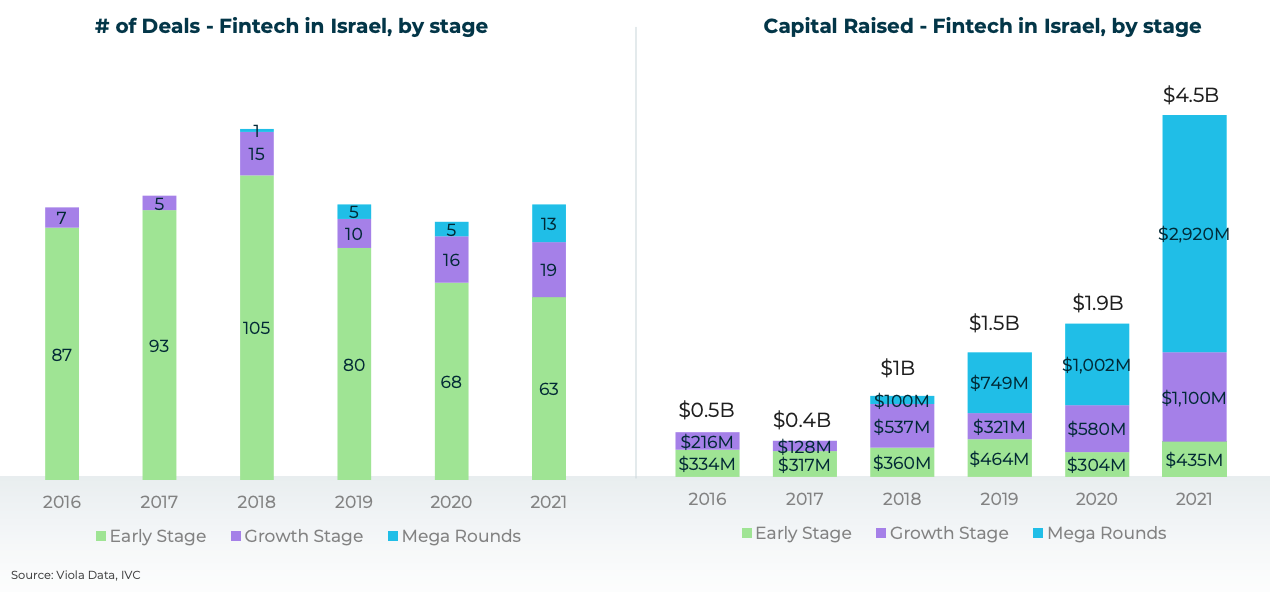
Israeli-founded fintech mega-rounds throughout the years, Source: Is Fintech Israel’s Hottest Sector?, Viola Group, 2022
The most notable mega-rounds announced in 2021 include Tipalti, an accounts payable automation startup, which raised a US$270 million Series F, Celsius Network, a cryptocurrency lending platform, which raised a US$750 million Series B, HoneyBook, a financial management platform for small businesses, which closed a US$250 million Series E, and Rapyd, a fintech-as-a-service company, which raised a US$300 million Series E.

Mega-rounds average and median deal size, Source: Is Fintech Israel’s Hottest Sector?, Viola Group, 2022
Deal sizes increased across all stages of funding, in fact, showcasing investors’ eagerness to back startups in the space. In 2021, the median deal size for early-stage funding rose from US$5 million in 2020 to US$6.9 million. Similarly, the median deal size for growth stage funding grew from US$34 million in 2020 to US$51 million to 2021. These figures mean that over the past four years, early and growth stages median deal sizes both nearly doubled.

Early and growth stages median deal sizes, Source: Is Fintech Israel’s Hottest Sector?, Viola Group, 2022
The Viola Group report, titled Is Fintech Israel’s Hottest Sector?, delves into the spectacular growth Israeli fintech startups witnessed in 2021, highlighting the biggest trends emerging and looking more closely at the stage of development of each key segment.
Looking at 2021’s metrics, it appears that the Israeli fintech industry continued to mature last year with category leaders solidifying their positions in the global market. This is evidenced by the rise in the number of mergers and acquisitions (M&As) deals, which increased from eight in 2020 to ten in 2021.
Payments in particular showed signs of maturity, recording the most exits between 2019 and 2021 at 17. This is followed by trading and investing (nine), and regtech/anti-fraud (seven). These three sectors are amongst the top six largest fintech segments in the Israeli-founded fintech ecosystem in terms of the number of companies.
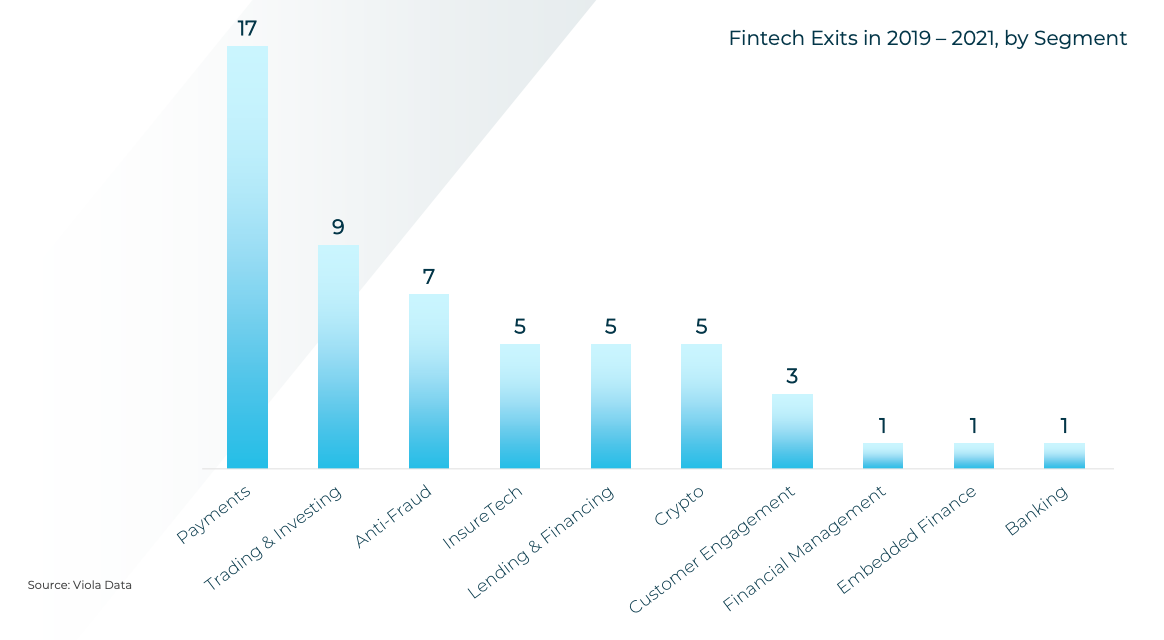
Fintech Exits in 2019 – 2021, by Segment, Source: Is Fintech Israel’s Hottest Sector?, Viola Group, 2022
Cryptocurrency and financial management as the most dynamic fintech segments in 2021
In 2021, cryptocurrency was amongst the two of the biggest segments in the Israeli fintech scene. Crypto startups saw by far the most dramatic growth in funding with over US$1 billion raised by companies in the space in 2021. That’s a 9x increase compared to 2020 (US$116 million).
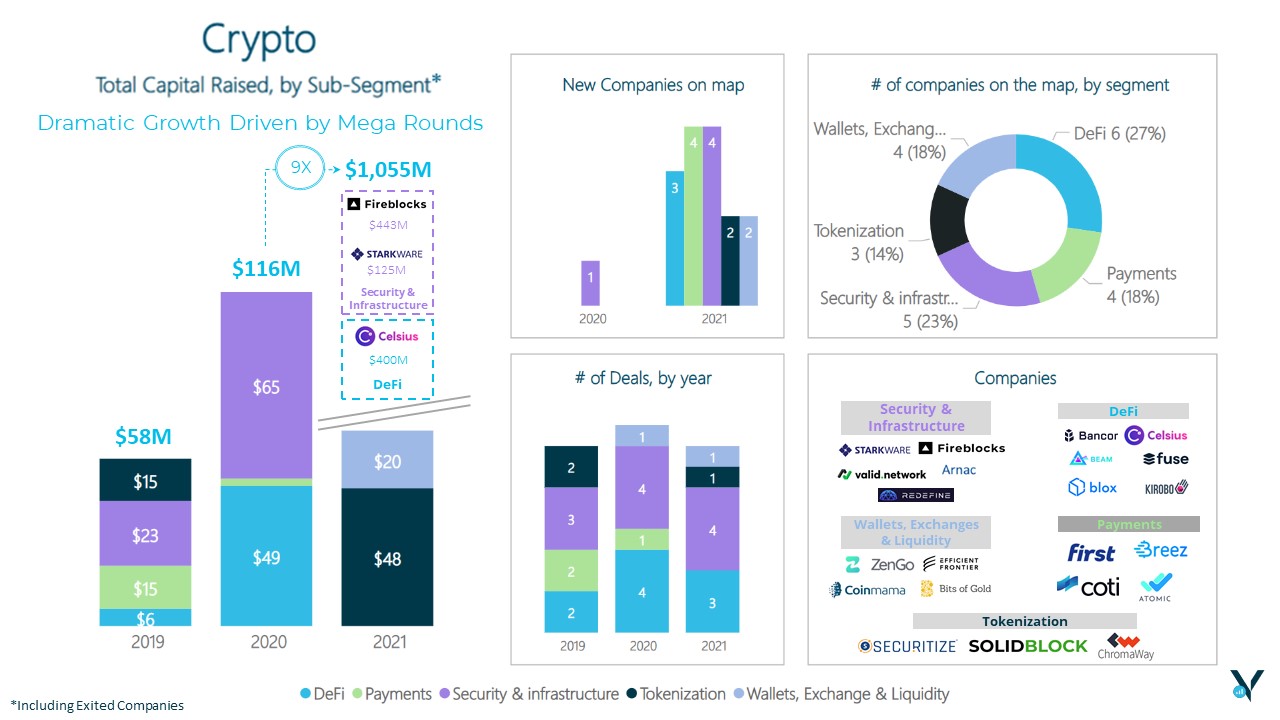
Israeli-founded crypto industry throughout the years, Source: Is Fintech Israel’s Hottest Sector?, Viola Group, 2022
The crypto sector also added some 15 companies in 2021, and three in 2020, making it the top fintech segment in terms of company creation, neck and neck with insurtech. With 22 companies, crypto is now the fifth largest segment in the Israeli fintech landscape.
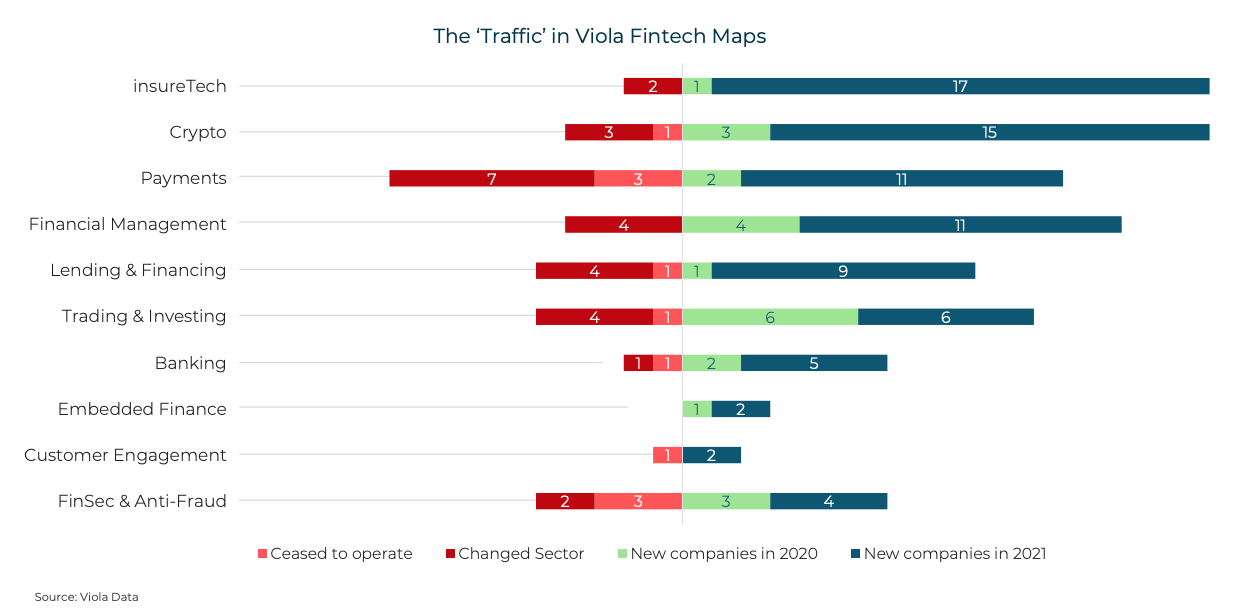
New company creation in the fintech sector, Source: Is Fintech Israel’s Hottest Sector?, Viola Group, 2022
After crypto, financial management was another hot segment in the Israeli fintech industry in 2021. In particular, the sub-segment human resources (HR) and payroll saw strong traction last year with a total of US952 million in funding raised. The segment added 11 companies in 2021, bringing the total number of Israeli-founded financial management companies to 17. This makes the sector the seventh largest segment in the Israeli fintech ecosystem.
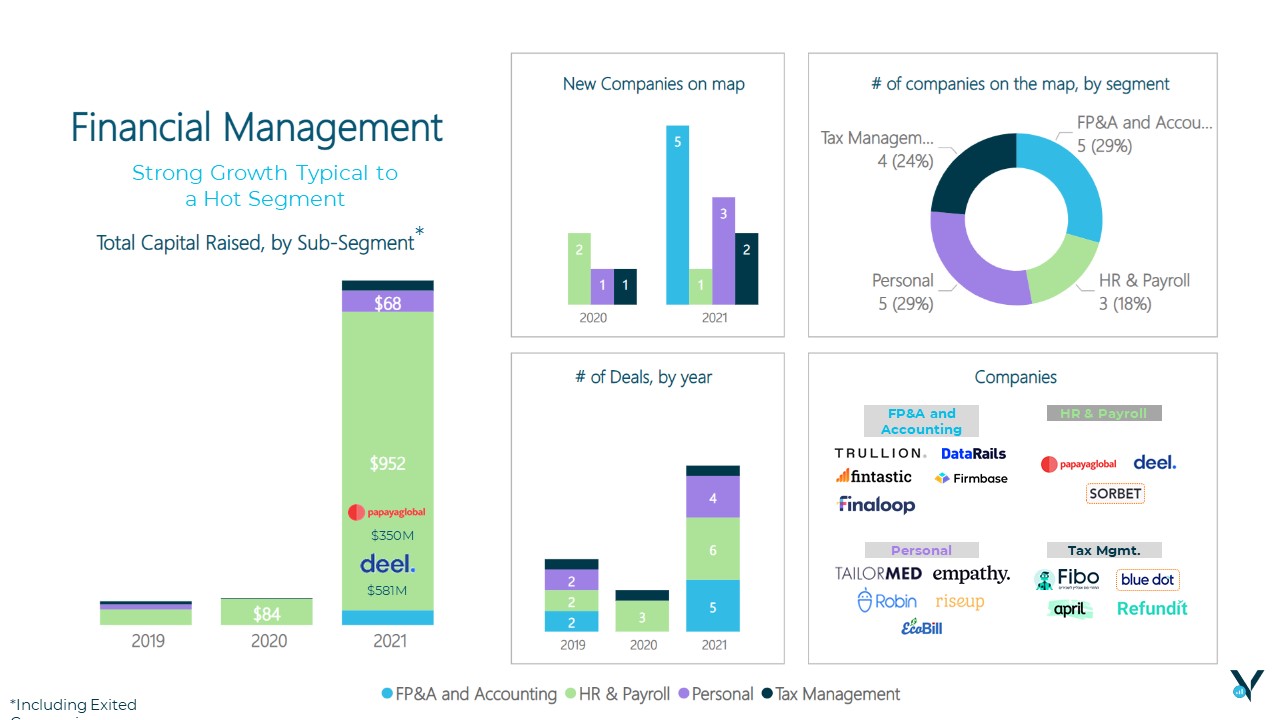
Israeli-founded financial management industry throughout the years, Source: Is Fintech Israel’s Hottest Sector?, Viola Group, 2022
With 17% of all time Israeli-founded unicorn startups being either fintech or insurtech companies, the report notes that fintech is becoming the country’s biggest tech sector. This is further evidenced by the proposition of fintech companies that made up these past years’ initial public offerings (IPOs). According to the report, out of the most significant Israeli-founded IPOs of 2020 and 2021, 23% involved fintech and insurtech companies. These include companies such as Riskified (US$3.3 billion valuation), Lemonade (US$3 billion), and Nayax (US$1 billion).
Several large mergers with special purpose acquisition companies (SPACs) were also recorded, including Payoneer (US$3.3 billion valuation) and Hippo (US$5 billion).



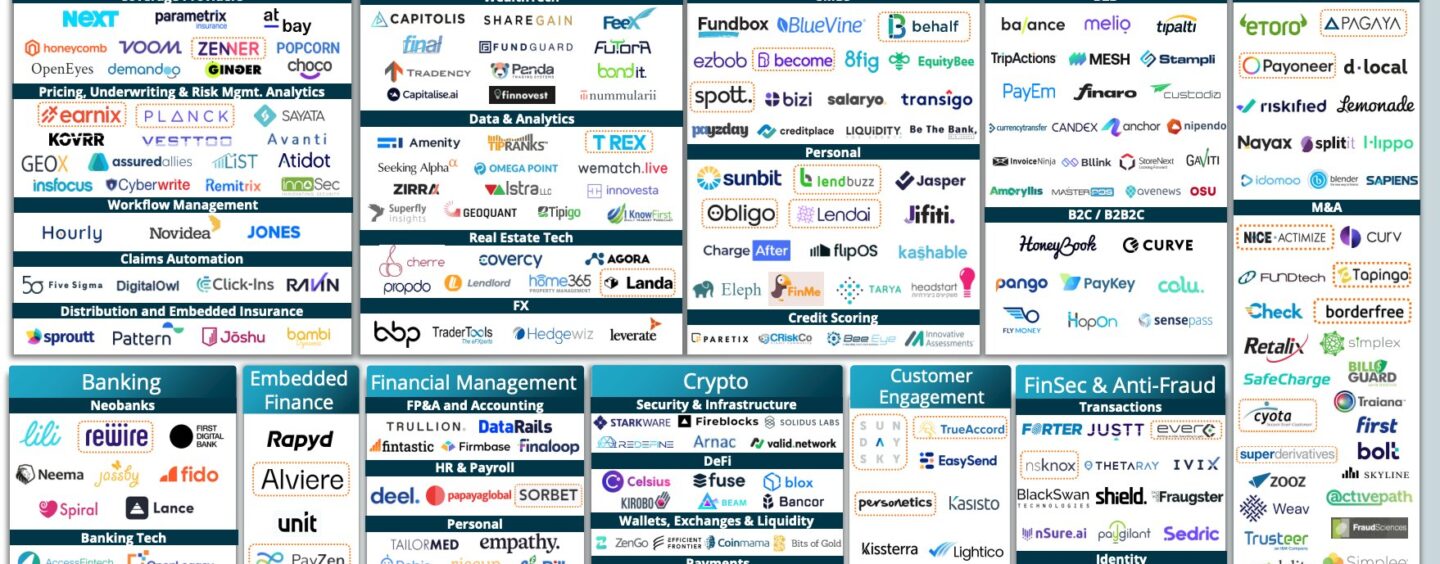
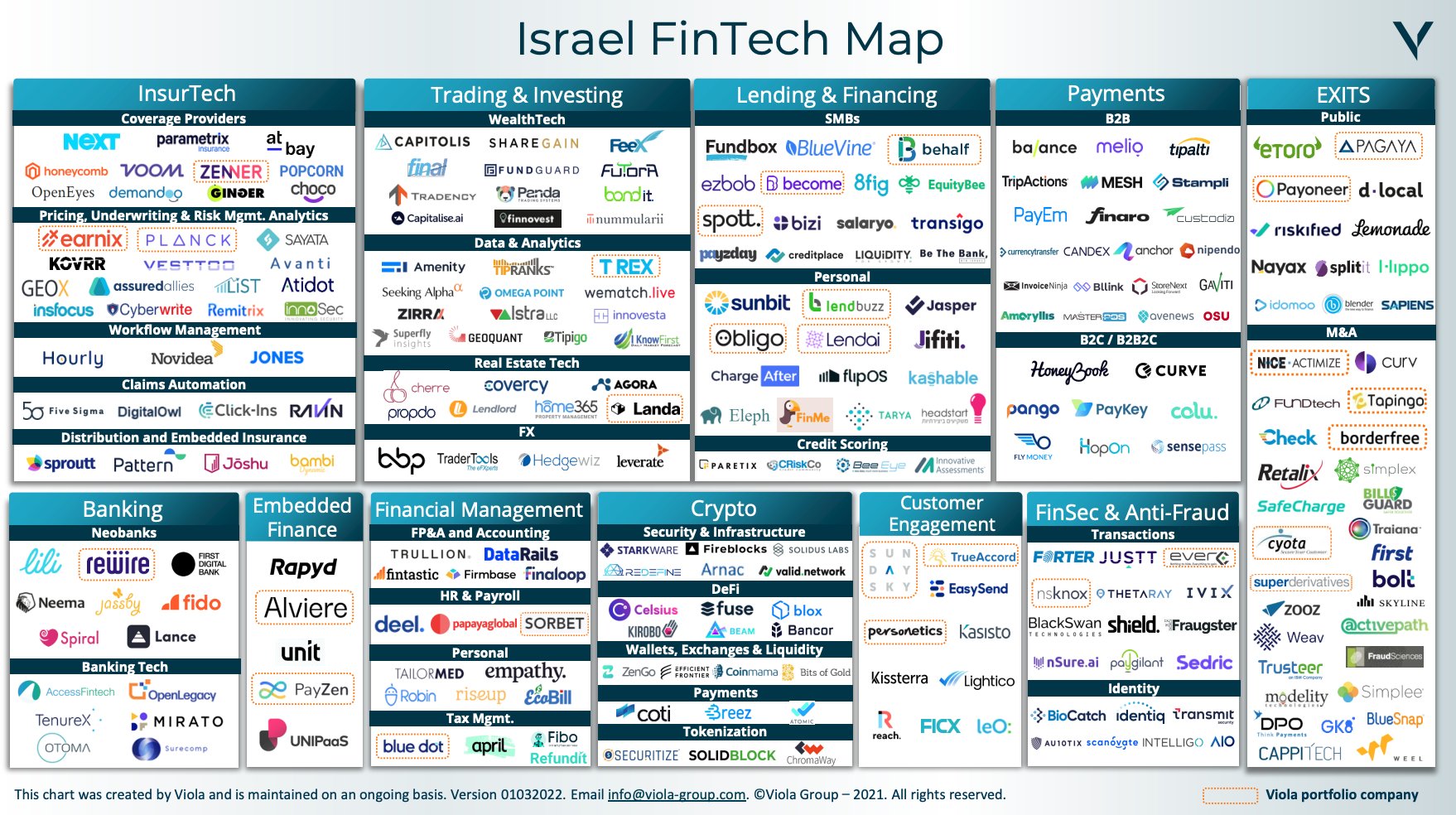




No Comments so far
Jump into a conversationNo Comments Yet!
You can be the one to start a conversation.